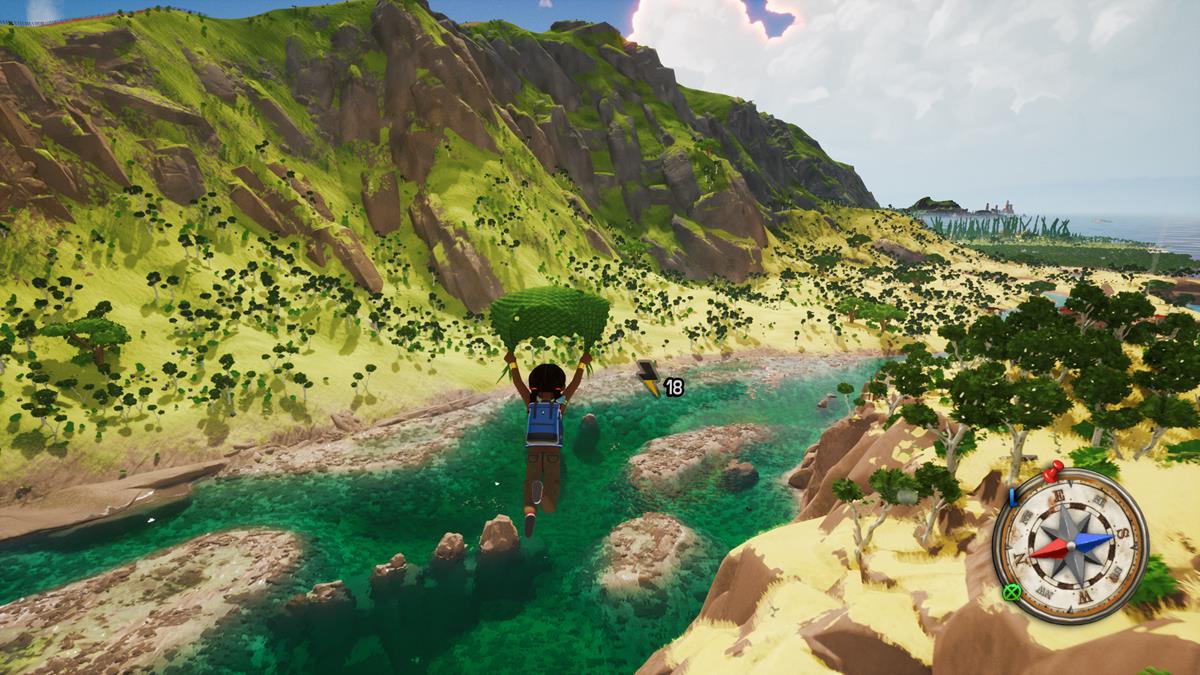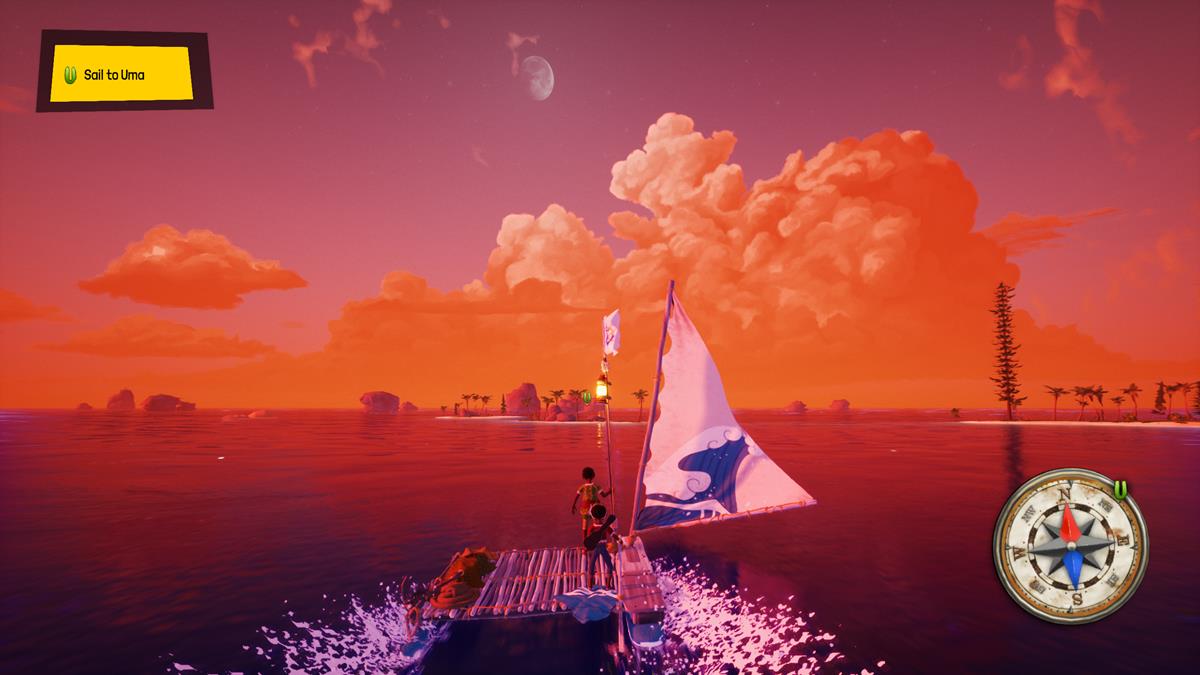Breath of the Wild did a great job of putting a unique spin on open worlds with its climbing and gliding mechanics. Tchia is partially built out of these and, yes, you spend a fair amount of timing increasing your stamina bit by bit until you’re able to climb and glide wherever you want without issue. But Breath of the Wild was so large that it was easy to bounce off of after dozens of hours. This is a much more compact game and it has a killer hook of a new mechanic that really separates it from its inspiration.
Tchia is a lovely, relaxing game. You explore a colorful natural area while grabbing trinkets, so I wasn’t expecting much of a heavy narrative. Tchia is a young girl who lives with her father. When the two meet up with one of his old friends, the right-hand man of an evil god that eats children abducts her father and it’s up to her to save him. You read that right. The bad guy is a fascist god that literally eats kids. This happens onscreen in a particularly disturbing cutscene, even if it’s not nearly as horrifying as it seems at first.
The story itself is quite good, even if it’s mostly an overly familiar tale. I can’t go into why that is without serious spoilers, but you’ll see if you end up grabbing the game. The cast of characters is decently realized and the dialogue keeps things moving. But the presentation is the real winner here. Despite being developed by a small team, Tchia is easily the best-looking 3D open-world indie game I’ve ever seen. The game is often downright gorgeous and the long draw distance only helps with presenting its beauty.
Screenshot by PC Invasion
I’m like a bird
Tchia‘s main story is extremely short. You’ve got an intro, then you go out and get your first quest, which is to travel from the Southern island to the Northern one and grab some items. Then there are some story sequences on a smaller island followed by an espionage mission where you go and take photos of factories before you sabotage them and then sabotage a larger factory. Then there’s a final quest and the story is over. If you just wanted to beat the game, you could easily do it in a few hours. However, this is absolutely not the type of game you’ll play just to beat.
Standard open-world rules are at play here. There are spots around the map that you’ll interact with to make icons show up. These include collectibles that are used to purchase cosmetics, cosmetic chests, enemy camps, activities, and upgrades to your various meters. Tchia is very much about exploring and taking in the sights, but the game’s soul ability makes for a pretty compelling hook. Tchia can possess any non-human animal she comes across, as well as many objects. Objects can be aimed and hurled at enemies as Tchia herself comes leaping out of them before they get slung forward.
Enemy encounters are rare, but the foes are all fabric. You’ll need to throw explosive objects at them, or you can possess a log in a fire and roll into them. Animals you can possess include birds, dogs, insects, crabs, deer, and various marine animals. It’s a joy to possess animals and get around the map more easily. At first, Tchia can only possess things for a short amount of time, but this increases greatly as you complete challenges. It really is something to see how the game opens up to you as you go. Challenges require you to carve totems to begin them and the challenges themselves are varied and interesting. Except for the one where you play tic-tac-toe.

Screenshot by PC Invasion
Ukulele of everything
Taking another page from a separate Zelda playbook, Tchia has a ukulele she carries around. You can bring it out at nearly any time to play a full suite of chords. If you know anything about music, you can play any number of actual songs with it, which is pretty fantastic, plus there are segments where Tchia plays her ukulele alongside other characters as part of a well-done minigame. But that’s not all the ukulele is for. There are certain little songs you can play that have effects on the world around you, just like in Ocarina of Time or Wind Waker. You’ll learn more of these by balancing rocks atop one another as part of another minigame.
These songs do a variety of things, such as change the time of day, spawn an explosive item or bounce pad, and they can even be used to summon animals to possess. While Tchia initially needs to walk everyone on foot or get there by gliding when you don’t come across an animal to possess, you’ll likely spend most of the game summoning birds with the ukulele and then flying around. It honestly looks and feels wonderful and it’s one of the most enjoyable parts of the game.
You can only naturally refill a certain amount of your spirit gauge (usually up to half) once it depletes, but you can completely refill it by eating food at stands or by eating at campfires, which are all over the map. I mentioned the cosmetics earlier and there are an absolutely enormous number of these to choose from, ranging from clothes, hairstyles, and even ukulele skins. The game isn’t meant to last a huge amount of time, but I put in about a dozen hours before I saw the credits. I grabbed as many stamina and soul meter upgrades as I could find, but there were still a lot of trinkets and challenges in which to partake.

Screenshot by PC Invasion
Give me a reason to love you
My main gripe with the game is that it just isn’t all that substantive, enjoyable as it may be. There are so many cosmetics that it can be hard to care about grabbing woven trinkets or diving for pearls to buy more. The reward for doing the numerous activities (such as shooting ranges or racing challenges) is also pretty pointless. You can get a trophy ranging from bronze to gold, but you can farm them from any challenge and they’re only used to try and win more cosmetics from a crane game. You also have to add each of them to your inventory individually, so you can’t stockpile them like trinkets and pearls, which is unfortunate.
I greatly enjoyed my time with Tchia, even though the story is very short and it ends up falling into a lot of typical open world traps. But it’s still a lovely game with plenty to gawk at if you’re into running around the world as animals or collecting things. I wish there was more of an incentive to buckle down and complete the optional stuff, but the game can easily last a dozen hours or more regardless. Let’s be real, though – flying around as a bird is well worth the price of entry alone.
